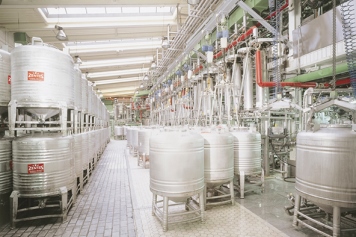Significantly simplified: food manufacturer Zentis relies on SAP manufacturing solution in production
The first use of SAP Manufacturing Integration and Intelligence (SAP MII) at Zentis in Aachen was given the title “vertical integration”. In addition to the replacement and integration of proprietary systems, as well as online data collection, the goal for the containers, which represent a central property of the Zentis business, was to implement a clear simplification and automation of the various process steps and the associated booking processes.
Through SAP MII, the Container Logistics System (CLS) achieves successful improvements in container availability locally, in a site and customer-specific way. A transparent and integrated tracking of the container content, from filling to the customer, improves the ability to deliver. The mapping of the life of the individual container now facilitates technical quality assurance and cost transparency.
Containers are delivered, checked, washed, filled, repeatedly weighed, and the quality checked, if necessary, they are transferred or reworked, and delivered to the client with tracking of the serial number. All of these processes had to be manually booked manually in SAP ERP to ensure the traceability of containers.
Paperless and automated recording

At the plants in Plymouth (USA), Philadelphia (USA), and Gardena (USA), with IGZ SAP MII Flow + Pack, all relevant process steps such as washing, weighing, pressure testing, and shipping of the containers are recorded in a paperless manner and automatically by means of the connection of the technical systems and to the container logistics system.
In a second step, the direct supply of the automatic production systems with the centrally managed in SAP ERP was implemented for the formula data production of the fruit preparation using SAP MII. The previous manual and therefore error-prone inputs of data on the systems are therefore completely eliminated.
The implementation was performed with the IGZ SAP MII Best Practices for the Electronic Work Instruction (EWI), which is based on the use of SAP ERP control formulas. By implementing configurable IGZ best practices, the requirements are implemented quickly and both the costs and implementation time are significantly reduced.
Back to overview

